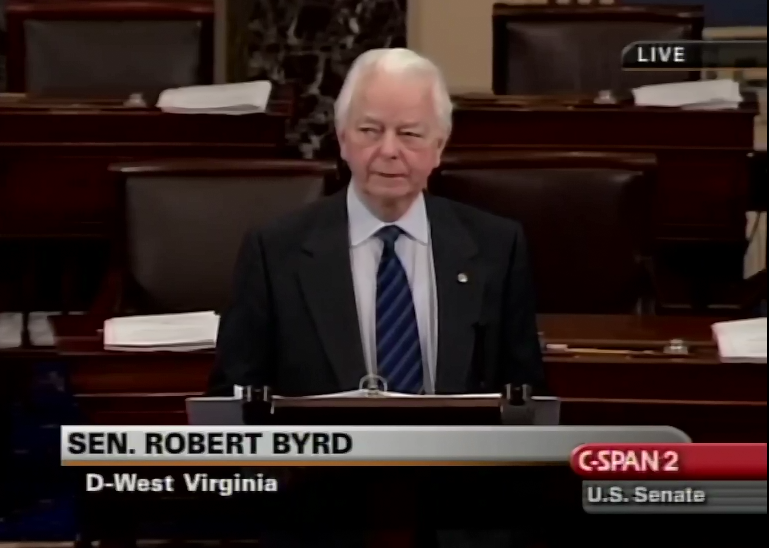|
This year, the Byrd Center has worked with over 125 educators in our first virtual Teacher Institute, exploring how Congress and the foundations of our representative democracy have been tested in critical moments of American history. One of the workshops these teachers have participated in is a deep dive into the way our country has historically decided to go to war and how those precedents were challenged in the wake of the September 11th terrorist attacks. In this workshop, we look back to the crucial debates and votes that took place on the House and Senate floors that brought the United States into one of its longest and most complicated military engagements. Senator Robert C. Byrd garnered national attention for his outspoken opposition to the Iraq War in late-2002 and early-2003. He even published a book of his speeches and commentary on the war entitled Losing America in 2004. The Byrd Center’s archives preserve thousands of letters that poured into the Senator’s office in response to his statements against the war, revealing a deeply divided nation. These documents along with the Senator’s own words reveal how the War on Terror in many ways shifted the power of war within the government and set new precedents for foreign policy in the United States. Over a year before Senator Byrd leveled his condemnation of the Senate “standing passively mute” amid the ramping up of the war in Iraq, another elected representative took a courageous and bold step to raise a warning about the dangerous precedents that were being set with the War on Terror. Just three days after the horrific terrorist attacks of September 11, 2001, as people across the United States continued to mourn and grapple with shock and a sense of paranoia, a historic act of dissent occurred on the floor of the House of Representatives. Shortly before Congress voted overwhelming in support of the Authorization for Use of Military Force against global terrorism, the lone voice of California Congresswoman Barbara Lee urged caution. “September 11th changed the world. Our deepest fears now haunt us. Yet, I am convinced that military action will not prevent further acts of international terrorism against the United States,” Congresswoman Lee stated, “some of us must urge the use of restraint.” Despite the vitriolic response that poured into her office in the days and weeks after her speech, Congresswoman Lee remained a resolute opponent to the course of action the United States decided to take in responding to the threat of terrorism. Her bravery laid the foundation on which 133 members of the House and 23 Senators, including Senator Byrd, stood just eleven months later when voting against the Iraq War Resolution. In his speeches and writings, Senator Byrd reflected on his actions in relation to another military conflict that challenged the execution of war powers in the United States. In interviews, Senator Byrd was frequently asked about his support for the Vietnam War, to which he responded that while his actions seemed correct at the time, in hindsight, he, and the rest of the country, was wrong. Congress itself made this realization before the Vietnam War ended when it passed the contentious War Powers Resolutions of 1973, overriding the veto of President Richard Nixon to reassert Congressional oversight and authority in matters of conducting war.
Our Teacher Institute workshop on this subject relies on the speeches, constituent letters, press interviews, and legislation that have determined our country's response to international crises. Comparing the 2001 Authorization for Use of Military Force with the 1941 Declaration of War passed by the Congress against Japan in retaliation for Pearl Harbor exposes the broad war powers granted to the president in 2001. Learning about the War Powers Resolution of 1973 helps us understand the push and pull of separation of powers and how this has played out in our nation's history. And examining the words of Congresswoman Lee and Senator Byrd, we see the need for deliberation and critical thinking to avoid rash decisions that do not take into account the potential consequences. Almost twenty years later, the prescience of Congresswoman Lee’s warning continues to bare on our discourse around the War on Terror. Her opposition to the notion of a war without a stated end goal, with no consideration of long-term foreign policy or economic implications, all subject to the decision of the executive with little oversight from the legislative branch, was the same mantel used by Senator Byrd in 2002 as he opposed going to war in Iraq. Indeed, a growing number of Americans now view these decisions with increasing regret as we grapple with the full impact of our actions and the lives of soldiers and civilians lost. Comments are closed.
|
Welcome to the Byrd Center Blog! We share content here including research from our archival collections, articles from our director, and information on upcoming events.
Categories
All
Archives
July 2023
|
Our Mission: |
The Byrd Center advances representative democracy by promoting a better understanding of the United States Congress and the Constitution through programs and research that engage citizens.
|
Copyright © Robert C. Byrd Center for Congressional History and Education
|


 RSS Feed
RSS Feed
